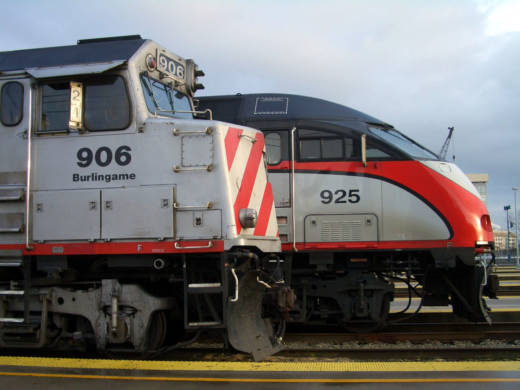San Mateo County's Board of Supervisors and the SamTrans board approved a "clean" version of the tax measure earlier this year and don't need a further vote.
The Santa Clara County Board of Supervisors approved the the tax measure on Tuesday morning, and the Santa Clara County Valley Transportation Authority board will consider it on Thursday.
In San Francisco, the Board of Supervisors will hold a special meeting Friday to pass a resolution without the Caltrain governance conditions approved last week. The city's Municipal Transportation Agency board, which voted down the tax measure last week, will meet Wednesday to reconsider it.
And the Joint Powers Board overseeing Caltrain will meet Thursday to formally approve the tax measure and pass a separate resolution committing the agency to reforming its governance structure.
The San Mateo County Transit District, or SamTrans, runs Caltrain — largely the result of the county paying for the line and never having been fully repaid. San Francisco and Santa Clara counties have argued that with their counties expected to pay about 80% of the estimated $108 million the tax will raise each year, they need to have a more meaningful voice in running the agency.
Among the changes sought by San Francisco Supervisor Shamann Walton and Santa Clara County Supervisor Cindy Chavez — both of whom serve on the Caltrain board — is the power to hire and fire the agency's CEO.
The resolution will also incorporate language limiting use of the sales tax proceeds pending enactment of the governance changes — due by Dec. 31, 2021 — and provide for immediate retention of counsel and auditor independent of SamTrans.
The Tuesday agreement also includes an undertaking by the parties to repay the $19.8 million San Mateo County is still owed for purchasing the Caltrain right-of-way from Southern Pacific in 1991. The source for that reimbursement is unclear.
Charles Stone, vice mayor of Belmont and a member of the Caltrain board, expressed some reservations about the repayment language.
That section says the Caltrain board will "initiate efforts" to reimburse SamTrans, including by "prioritizing the payment of the (SamTrans) investment ... if the Caltrain tax measure is approved."
"If that's meant to say the revenues from the one-eighth-cent sales tax should be used to pay back the SamTrans investment, that's saying that San Mateo County taxpayer money should be used to pay back the San Mateo County taxpayers," Stone said. "I hope that's not what it's meant to say. If it is, it's a real problem."
But Walton said that's not the resolution's intention.
"There's nothing in the resolution that leads me to believe we are discussing sales tax money going toward reimbursement for San Mateo County," he said. "We're going to focus on a solution to make SamTrans and San Mateo County whole." He added that repaying San Mateo County for the initial investment that made Caltrain possible "has never been a point of contention for me."
He said his push for a new governance agreement is "really about making sure that all three (Caltrain) counties have an equitable say in management."

